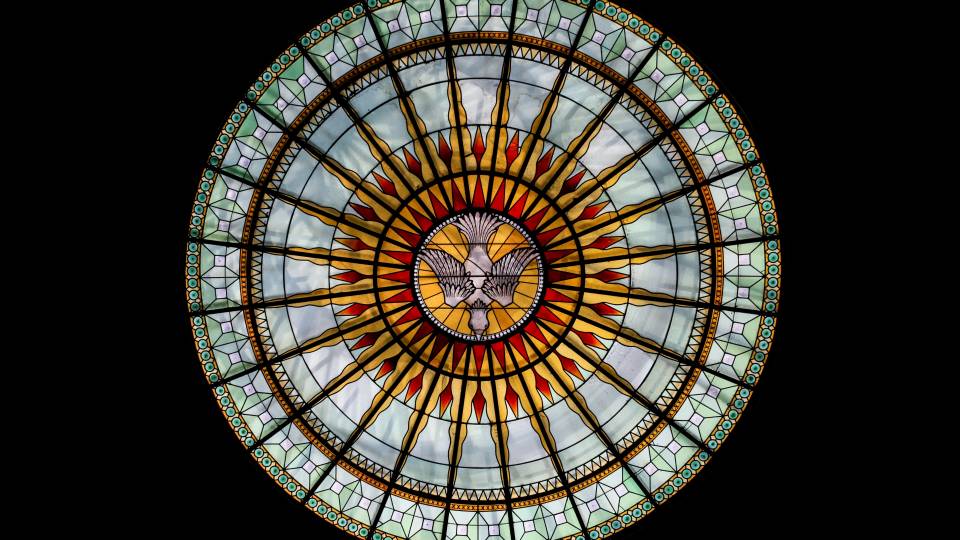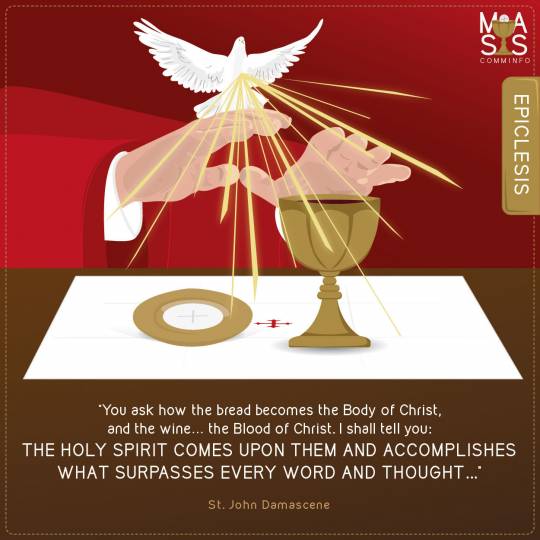Deacon-structing The Spirit: Part 2 | The Mass
Deacon Pedro
Sunday, June 9, 2019

“The Gloria in excelsis is a most ancient and venerable hymn by which the Church, gathered in the Holy Spirit, glorifies and entreats God the Father and the Lamb.” (GIRM #53)The last line of the Gloria says: “For You alone are the Holy One, you alone the Lord, you alone the Most High, Jesus Christ, with the Holy Spirit in the Glory of God the Father.” In the Gloria we profess that Jesus is the Holy One, the Lord, the Most High, with the Holy Spirit in the Glory of the Father. Again, we do not speak of Jesus or God the Father without mentioning the Holy Spirit. Right after the Gloria we pray the Collect, the Opening Prayer. This prayer, no matter what it is (because it’s different every Sunday), always ends with the same formula. We pray “through our Lord Jesus Christ, your Son, who lives and reigns with you in the unity of the Holy Spirit, one God, for ever and ever.” Jesus lives and reigns with the Father, in the unity of the Holy Spirit. Again, the Trinity professed. During the Liturgy of the Word there may or may not be mention of the Holy Spirit depending on the readings. Chances are that, unless it’s the Easter season, we are not going to hear the words “Holy Spirit” mentioned in the readings. But, what is happening during the Liturgy of the Word? What happens while we’re listening to a reading? What happens afterwards? We listen and we reflect in silence. Again, the GIRM says that through this silence “under the action of the Holy Spirit, the Word of God may be grasped by the heart and a response through prayer may be prepared” (GIRM 56). It is by the action of the Holy Spirit that the Word that we hear can take root in our hearts and can come alive in us. Once again, during the Profession of Faith we profess that we believe in the Holy Spirit. Before we get to the part about the Holy Spirit, we say that we believe that “by the Holy Spirit” Jesus became man: “and by the Holy Spirit was incarnate of the Virgin Mary, and became man” (Nicene Creed). The Apostles' Creed says that Jesus was “conceived by the Holy Spirit.” Later on in the Nicene Creed, we pray:
“I believe in the Holy Spirit, the Lord, the giver of life, who proceeds from the Father and the Son, who with the Father and the Son is adored and glorified, who has spoken through the prophets.”This is what we believe: The Holy Spirit proceeds from the Father and the Son, but the Spirit is also the giver of life, and it is the Spirit who has spoken to us through the prophets. Most importantly (and this we forget), the Spirit deserves to be adored and glorified.
Once we enter into the Liturgy of the Eucharist, the power of the Spirit really begins to work.
During the Eucharistic Prayer the priest, in the name of the entire community, addresses God the Father through Jesus Christ in the Holy Spirit (GIRM #78). It’s interesting to listen to the Eucharistic Prayer and pay attention to when the Holy Spirit is mentioned. The most obvious time is during the epiclesis. The epiclesis is the part of the Mass (and of all Sacraments) when the “Church implores the power of the Holy Spirit that the gifts offered by human hands (the bread and the wine) be consecrated"(GIRM #79c). This is the moment when we ask for the Spirit to descend and make the Sacrament possible. Epiclesis is a Greek word that means “to invoke upon”. In the Eucharistic Prayer, during the epiclesis the priest asks God to send his “Holy Spirit upon the gifts of bread and wine so that they may become for us the Body and Blood of our Lord.” The second Eucharistic Prayer is probably the one we are most familiar with:“Make holy, therefore, these gifts, we pray, by sending down your Spirit upon them like the dewfall, so that they may become for us the Body and Blood of our Lord Jesus Christ.”All Eucharistic Prayers have a similar formula. At this time the priest will extend his hands, palms down, over the bread and wine as he says the prayer. He then makes the sign of the cross over the gifts. If the priest is using Eucharistic Prayer #4, pay extra special attention to hear all the other times that the Holy Spirit is mentioned. Then follows the Consecration. Even though the Holy Spirit is not mentioned, always remember that whatever is happening there on the altar, is happening because of the Holy Spirit. There is another moment during the Eucharistic Prayer that is called the oblation. The second Eucharistic prayer says, “Humbly we pray that, partaking of the Body and Blood of Christ, we may be gathered into one by the Holy Spirit.” It’s because of the Holy Spirit that we offer the Sacrifice but also learn to offer our very selves “and so day by day to be brought, through the mediation of Christ, into unity with God and with each other, so that God may at last be all in all” (GIRM #79f). It’s because of the Holy Spirit that Communion is made possible. Finally, the Eucharistic Prayer ends with the words of the Doxology, which we have all heard so many times:
“Through him, and with him, and in him, O God, almighty Father, in the unity of the Holy Spirit, all glory and honour is yours, for ever and ever.”Once again, we adore God, the almighty Father, through Christ, with Christ and in Christ, in the unity of the Holy Spirit. There are several prayers that the priest prays quietly and so we never hear them. One of them happens right after the Lamb of God. The priest prays:
“Lord Jesus Christ, Son of the living God, who, by the will of the Father and the work of the Holy Spirit, through your Death gave life to the world, free me by this, your most holy Body and Blood, from all my sins and from every evil; keep me always faithful to your commandments, and never let me be parted from you.”Once again, he is asking that whatever happens, happen by the work of the Holy Spirit. This is also true for Communion. The Eucharist is about Jesus. He is the Eucharist. The bread and wine are transformed into His body, blood, soul, and divinity. It is His Divine Presence. But it would not be possible without the Holy Spirit. This is why it is most appropriate to pray to the Holy Spirit - pray for the Holy Spirit - during Communion. Pray that the Spirit makes you one with Christ and one with each other. At the end of Mass, we receive the blessing: “May almighty God bless you, the Father, the Son, and the Holy Spirit.” We are blessed by the Trinity – that includes the Holy Spirit. Next time you are at Mass, pay attention to how many times the Holy Spirit is mentioned and pay attention to how the Spirit is at work. I would say that everything that happens at Mass happens by the work of the Holy Spirit. This includes what God is working in our hearts during Mass, what we pray to the Father and/or to the Son, what the Father and Son ask for us, and how we are all brought into Communion because of the action of the Mass.

- To learn more about the Mass and what is happening during the Mass, read all of my Deacon-structing The Mass posts: Part 1: Full, Conscious, and Active Part 2: The Entrance Part 3: The Penitential Rite, Gloria, and the Collect Part 4: Liturgy of the Word Part 5: The Readings Part 6: Homily, Creed, and Universal Prayers Part 7: The Liturgy of the Eucharist Part 8: The Eucharistic Prayer Part 9: Deeper into the Eucharistic Prayer Part 10: The Communion Rite Part 11: Communion Part 12: Concluding Rites Part 13: Go and Proclaim
 Every week, Deacon Pedro takes a particular topic apart, not so much to explore or explain the subject to its fullness, but rather to provide insights that will deepen our understanding of the subject. And don’t worry, at the end of the day he always puts the pieces back together. There are no limits to deaconstructing: Write to him and ask any questions about the faith or Church teaching: pedro@saltandlighttv.org
Every week, Deacon Pedro takes a particular topic apart, not so much to explore or explain the subject to its fullness, but rather to provide insights that will deepen our understanding of the subject. And don’t worry, at the end of the day he always puts the pieces back together. There are no limits to deaconstructing: Write to him and ask any questions about the faith or Church teaching: pedro@saltandlighttv.orgRelated Articles:
Category: Current Affairs, Environment, General Posts, Laudato Si', Producer Diaries
Tag: climate change, Climate Change Toronto, Environmental Crisis, environmental issues, Fridays for Future, Global Catholic Climate Movement, Greta Thunberg, Laudato Si', School Strike for Climate
My Manresa Story: Resting a While
Monday, February 24, 2025
 Gianpaolo Capozzi
Gianpaolo Capozzi
At the Manresa Spiritual Renewal Centre in Pickering, ON, retreatants of all ages can encounter a God of surprises.
A House Not Made With Hands: St. Anne’s Anglican Church
Friday, February 21, 2025
 Scott Harris
Scott Harris
In June, 2024, the domed roof and interior of St. Anne's Anglican Church in Toronto tragically burned down. However, the parish community continues to stand strong and serve its neighbourhood.
Pray with Pope Francis Reflection – February 2025
Friday, February 7, 2025
 Fr. Edmund Lo, SJ
Fr. Edmund Lo, SJ
Pope Francis invites us to pray for vocations to the priesthood and religious life, that the ecclesial community might welcome the desires and doubts of those young people who feel a call to serve Christ’s mission in the priesthood and religious life.
Pray with Pope Francis Reflection – January 2025
Tuesday, January 7, 2025
 Fr. Edmund Lo, SJ
Fr. Edmund Lo, SJ
Pope Francis invites us to pray for the right to an education for migrants, refugees and those affected by war; that their right to an education, which is necessary to build a better world, may always be respected.
What the CND sisters are looking forward to this Christmas
Tuesday, December 17, 2024
 Maria Montemayor
Maria Montemayor
I had the wonderful opportunity to meet with the CND sisters and enjoy a special lunch of soup, pizza, salad, and dessert. While I was there, I thought it would be a great opportunity to ask the sisters about what they were looking forward to this Christmas.













